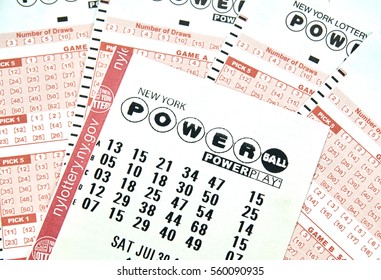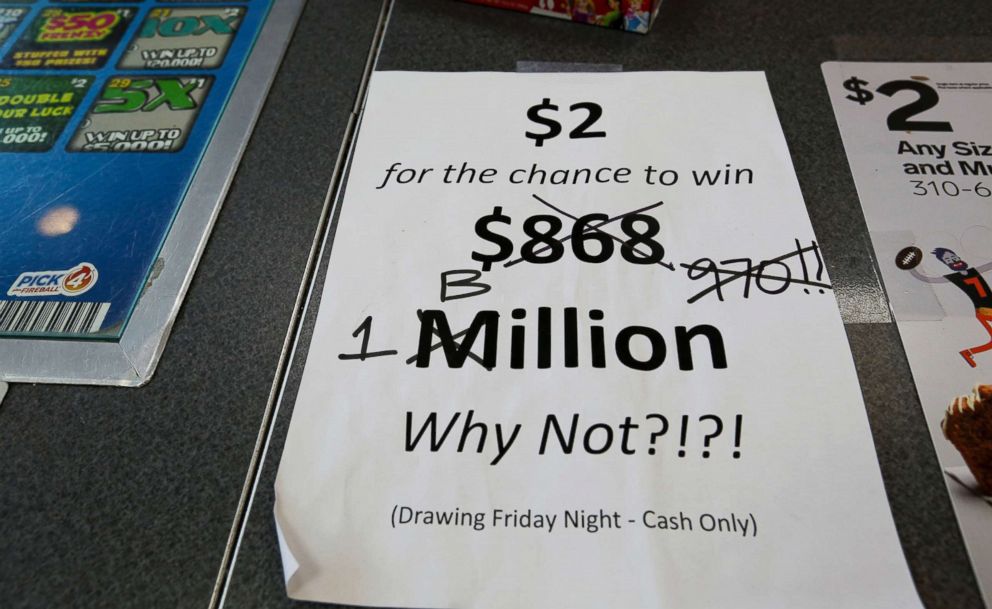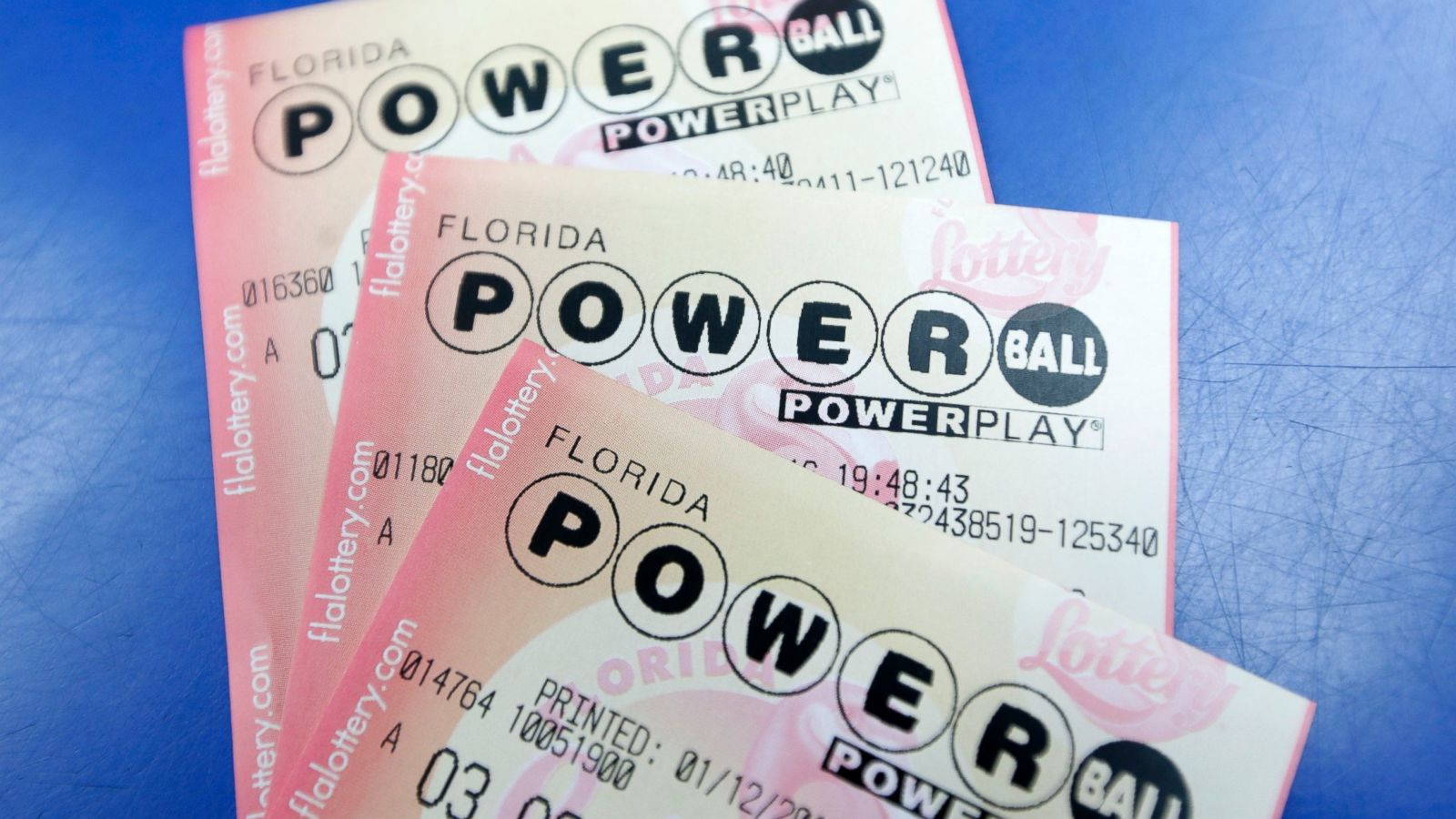Lottery For All 50 States
The state's first lottery ticket was purchased by then-governor William Cahill in December 1970. He didn't win - 'luckily for the future of the lottery,' as one resident put it. The $50,000 prize was claimed by a widow who remained anonymous. New Jersey now allows all lottery winners stay anonymous if they choose, under a law passed in January. Disclaimer: Information found on this website is believed to be accurate. If you have questions about the winning numbers, contact the Lottery at (781) 848-7755 or visit your nearest Lottery agent or Lottery office for the official winning numbers.
- Top 10 States That Love the Lottery
It's no secret that Americans enjoy playing the lottery, and nowhere more than in these 10 states that spend the most per person on lottery tickets.
The average adult spends around $288.06 per year on lottery tickets, but in the highest-rolling states, residents spend about two to three times that much, according to U.S. Census data on lottery ticket sales and prizes.
Here are the top 10 states that spend the most per adult on lottery tickets annually, ranked from least to most.
10. South Carolina
Yearly lottery spend per person: $393.90.
South Carolina generated ticket sales of $1.52 billion in 2017. The money raised by the Lottery is distributed to higher education; almost $4.25 billion goes to scholarships.
South Carolina is one of a few states that allow lottery winners to stay anonymous without conditions.
Notable winner: An anonymous South Carolina woman won the $1.537 billion Mega Millions jackpot on October 23, 2018. It was the largest jackpot ever won by a single ticket worldwide. The winner chose the cash option of $877,784,124 million.
9. Connecticut
Yearly lottery spend per person: $405.91.
Connecticut lottery sales were nearly $1.15 billion in 2017.
The state's lottery was launched in 1972 and tickets cost just 50 cents. Connecticut was the fourth state to start a lottery.
Notable winner: William Mclaughlin of Danbury won a $25.8 million Connecticut Lotto jackpot on November 1, 2019. He chose to take the cash option of $21,365,302.
8. Maryland
Yearly lottery spend per person: $413.81.
The Maryland Lottery contributes most of its profits to the state General Fund, which provides funding for education, health and safety services, with some money going to the horse racing industry.
In 1973, a man won the state's first $1 million prize (which would be $5.9 million now), at a 'Millionaire Party' for 100 randomly chosen players. The winner fainted when his name was announced.
Notable winner: 'The Three Amigos' were one of three winning tickets that split the $656 million Mega Millions jackpot on March 30, 2012, with each winner collecting $218.6 million.
7. West Virginia
Yearly lottery spend per person: $419.15.
West Virginia makes $6.1 million on ticket sales, much less than other top-spending states, but its per capita sales are still high.
The state pays the second-highest lottery winnings per capita in the country, $307.53 (Massachusetts is first).
West Virginia lets winners of over $1 million stay anonymous ... but there's a catch. Those who want to keep their privacy must take a smaller payout, giving five percent of their prize money to the State Lottery Fund.
At least the money's going to good causes, including education, seniors' programs, tourism, and state parks.
West Virginia was one of the original five states and the District of Columbia that formed the Multi-State Lottery Association, which today runs Powerball and Mega Millions.
Notable winner: Jack Whittaker probably had the best holiday season ever when he won a $315 million Powerball jackpot in December 2002 - at the time, the largest prize ever won by a single ticket.
6. New Jersey
Yearly lottery spend per person: $434.98.
12 percent of residents play the lottery weekly.
The state's first lottery ticket was purchased by then-governor William Cahill in December 1970. He didn't win - 'luckily for the future of the lottery,' as one resident put it. The $50,000 prize was claimed by a widow who remained anonymous.
New Jersey now allows all lottery winners stay anonymous if they choose, under a law passed in January 2020.
Notable winner: Richard Wahl of Vernon won the $533 million Mega Millions jackpot on March 30, 2018. He took the cash option of $324.6 million, saying he would use some of it for charity work. In 2019 he purchased a damaged resort in Florida.
More recently, Michael Weirsky of Alpha in Warren County won a $273 million Mega Millions jackpot on March 1, 2019. Incredibly, he almost lost the winning ticket!
5. Georgia
Yearly lottery spend per person: $515.17.
The lottery is just peachy, according to the five percent of residents who say they buy a ticket daily. Georgia had over $4.02 billion in ticket sales in 2017.
But one thing residents might need to work on is checking their tickets. In 2011, a $77 million Powerball ticket expired when no one claimed the prize! More recently, a $1 million Powerball ticket expired on February 4, 2018.
Notable winner: Ira Curry, a grandmother from Stone Mountain, won half the $648 million Mega Millions jackpot on December 17, 2013. She opted for the lump sum payout and received $173,819,742.50 before taxes. Curry said she chose her winning numbers based on family birthdays and the number 7. The other winner was delivery driver Steve Tran of California.
4. New York
Yearly lottery spend per person: $538.24.
New York had lottery sales of $10.29 billion in the 2018-19 financial year. All lottery profits go to funding the state's K-12 education. The state also pays the fourth-highest amount nationally in lottery prizes, $234.47 per capita.
The Empire State ranks number one in total dollars spent on the lottery. However, due to population differences between states, looking at spending per adult indicates which states have more active players.
New York wasn't the first state to start a modern lottery - that was New Hampshire in 1964 - but its Lotto game is the oldest in the country, launched in 1967.
Notable winner: A $437 million Mega Millions jackpot was won on New Year's Day 2019 by a group of 23 coworkers from Long Island who split the $262.2 million cash option.
Although the governor had just vetoed a bill to allow lottery winners to stay anonymous in New York, the winners successfully kept their identities private by claiming via a company, New Life 2019, LLC.
3. Delaware
Yearly lottery spend per person: $616.74.
Folks in Delaware spend a lot per head on the lottery, but 38 percent said they'd never purchased a lottery ticket. So who's buying them all?
The state's Lottery, which started in 1975, distributes revenue to the state's General Fund, with the money going to state services like education, policing, and health. The Lottery is the fourth-largest contributor to the state's coffers.
Delaware ranks 24th in the nation for the amount of lottery revenue it pays back to players as prizes, at $114.45 per capita.
The Delaware Lottery also has the highest operating costs per person of any state, $53.51 per capita in fiscal year 2016. Oregon is the second-highest at $24.71.
Delaware is one of the few states where lottery winners can stay anonymous without any strings attached.
Notable winner: A Delaware ticket won a $121.6 million Powerball jackpot on December 17, 2016. The ticket was bought in Selbyville and the anonymous winner chose the $72.15 million lump sum payment.
2. Rhode Island
Yearly lottery spend per person: $626.11.
The nation's smallest state has a big love for the lottery, but is the affection returned? Rhode Island is number two in the country in lottery spending, but second from the bottom in the amount of lottery money given as prizes: $157 million.
However, players will surely be happy that the state tops the nation in the amount of lottery proceeds it spends on state needs: $349.71 per capita, much higher than the U.S. average of $71.03.
The proceeds from the state's lottery go to the General Fund, contributing to education, health care, safety and the environment.
After starting its own lottery in 1974, Rhode Island was one of the original five states, plus Washington D.C., that formed the Multi-State Lottery Association. In 1988 the organization launched the game that later became Powerball. Today the Association also administers Mega Millions.
Notable winner: 81-year-old Louise White, of Newport, won a $336.4 million Powerball jackpot in March 2012. At the time it was the third-largest Powerball prize ever.
1. Massachusetts
Yearly lottery spend per person: $933.33.
Massachusetts is in no danger of losing its top ranking as the most lottery-loving state in the country - on average, each resident drops over $300 more on tickets per year than Rhode Island. 5 percent of Massachusetts residents say they play every day, and the state had lottery sales of $5.09 billion in 2017.
Massachusetts players benefit from a 71.9 percent prize payback ratio - that's the percentage of ticket sales that are paid back to players in winnings. The payback ratio equates to approximately $564.07 per adult.
Lottery Results For All 50 States
The Massachusetts Lottery is also proud that they were the first to offer scratch-off tickets. In 1974, 'The Instant Game' gave players the chance to win a top prize of $10,000.
Notable winner: In August 2017, Mavis Wanczyk, of Chicopee, won what was at the time the largest single-ticket U.S. lottery prize ever, a $758.7 million Powerball jackpot. The hospital employee quit her job after she won.
Eastern States Spend the Most on the Lottery
What do these lottery-loving states have in common?
They're concentrated along the East Coast, with five in the Northeast, and the remaining five in the South Atlantic region.
Maybe this isn't surprising, because playing the lottery has a long history in the East, going back to colonial America.
Eastern states were also the first to launch modern lotteries, beginning with New Hampshire in 1964. New York started its lottery in 1967, which was so successful that 12 more states followed in the 1970s: Connecticut, Delaware, Illinois, Maine, Maryland, Massachusetts, Michigan, New Jersey, Ohio, Pennsylvania, Rhode Island and Vermont.
Part of this rapid growth in Eastern lotteries was due to the 'domino effect' - states whose neighbors have the lottery are likely to launch one themselves to avoid losing revenue across borders.
If you've ever wondered why it seems like the East Coast states hit more jackpots than other areas, check out this article on why some states seem to win the lottery more than others.
More High-Spending Lottery States
These states didn't quite make it into the top 10, but according to U.S. Census data they're still in the top 22 states with the highest annual lottery purchases per adult. Ranked from low to high, they are:
- Tennessee: $264.27
- New Hampshire: $265.50
- Missouri: $268.69
- Kentucky: $269.91
- Virginia: $286.86
- North Carolina: $287.25
- Illinois: $287.42
- Ohio: $312.06
- Oregon: $313.44
- Florida: $353.77
- Pennsylvania: $367.88
- Michigan: $388.97
States That Spend Least on the Lottery
On the other end of the spectrum, which states play the lottery least?
The most frugal state when it comes to lottery tickets is North Dakota, with an average of just $46.72 spent per adult per year. That's about 5 percent of what Massachusetts spends!
Montana residents also pinch their pennies, spending $61.18 a year, while Oklahoma also sticks to a tight budget and spends $70.79 annually.
Louisiana is last in the nation in prize payback ratio - just 51 percent of its lottery ticket sales were paid back to players as prizes. North Dakota was barely higher at 51.8 percent.
$155 Million
- Online Lotteries USA
A number of states have already rolled out online lottery platforms as they look for ways to make their products as entertaining and accessible as possible, while other states are looking to follow in their footsteps and introduce their own. But just where is it possible to buy lottery tickets over the internet in the USA and which other states might be offering online lotteries soon?
Where Can You Play Online?
You can currently play the lottery online in ten U.S. states. They are:
In addition, the states below offer lottery subscriptions, where you can buy lottery tickets for multiple weeks at a time:
These differ from full online lottery services as you cannot buy individual tickets. Instead, you have to commit to play for a minimum number of weeks or spend a certain amount of money on tickets.
Online lotteries and subscription services are only available to people located in each of the states listed above. They all require you to create an account and provide some personal details before you can buy tickets or subscriptions.
Messenger Service
Now you can play Texas lottery games online via a lottery messenger service if you live in the Lone Star State or outside of the USA (but not in other US States).
Whilst in Oregon, you can play via messenger service within the state, but not from other states nor outside the USA.
Visit the lottery tickets page to view all the games that you can currently play online from your current location via messenger services - more are being added all the time!
How Online Lotteries Began In the U.S.

The door was only opened for the possibility of online lotteries in December 2011, when the U.S. Justice Department reversed a ban on many forms of internet gambling. While the ruling continued to outlaw sports wagers, it did allow states to start exploring and discussing legislation for online lotteries.

Illinois became the first state to offer online ticket sales when it set up a pilot program in March 2012 to sell Lotto and Mega Millions tickets, a scheme that was later given a wider rollout. Georgia followed suit in November 2012, while Michigan’s online lottery went live in the fall of 2014.
Kentucky introduced lottery ticket sales over the internet in April 2016. Lawmakers had granted their approval in 2013, but it took three years for the state to develop a robust ticketing system. Pennsylvania brought out its first batch of online lottery products in May 2018, with Mega Millions and Powerball following in January 2020.
New Hampshire became the sixth state to get in on the act, despite concerns from retailers that an online lottery would lead to reduced sales in local stores. The state’s iLottery platform was launched in September 2018, offering various instant win games and the opportunity to purchase Mega Millions and Powerball tickets online.
What about the Future?
It can take a number of years to introduce online lotteries, as states have to pass detailed legislation before they can even decide on which games to offer. Once this is done, they need to develop a secure and scalable ticketing system, something that the Kentucky Lottery found can take a long time. The Minnesota Lottery launched online products in the first quarter of 2014, but lawmakers later insisted they had not been given explicit approval and the games were pulled in May 2015.
There are still a few jurisdictions which do not offer a lottery at all. Players in Alabama, Utah, Hawaii, Nevada, and Alaska all currently have to travel to other states to buy tickets, while Mississippi is set to get a lottery for the first time within the next year after lawmakers approved a bill for one in August 2018. An online lottery platform may follow in the state, but further legislation will need to be passed before this can happen.
New Jersey, Massachusetts, Connecticut and Hawaii all had online lottery bills proposed in 2017, but all of them were rejected. Hawaii has some of the strictest gambling laws in the country so it is unlikely that a lottery – online or otherwise – will be available to play there any time soon.

Massachusetts may soon offer an online lottery after neighboring New Hampshire launched its own. Officials hope that an online platform would “modernize” the lottery and defend against competition from the state’s expanding casino industry. Executives at the Connecticut State Lottery hold a similar position and have said that they want to “modernize distribution channels through the internet.”
New Jersey is the closest of all these states to having its own online lottery, after it became the first to legalize online lottery couriers in 2017. These are services which buy lottery tickets on behalf of their customers, who enter their orders via the courier’s website. The experience is very similar to buying tickets directly from an online provider. While further legislation is needed before an official online lottery can be introduced, New Jersey’s acceptance of third-party couriers means that this may not take long.
Online Lotteries at a Glance

All Us States Lottery Results
Take a look at the map below to see which US states have passed online lottery bills, as well as those states in which bills have previously been introduced but not passed.
$155 Million